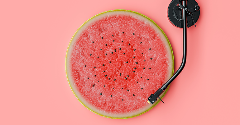News
Fruit and vegetable powders add clean label nutrition, colour and flavour
25 Jun 2018Fruit and vegetable powders are appearing in a range of foods and drinks to improve their flavour, colour, nutrition and texture, driven by the trend toward whole foods and consumer desire to boost fruit and vegetable consumption.

The market for fruit and vegetable ingredients is set to grow at a 5.8% CAGR to reach $216 billion by 2022, according to MarketsandMarkets. The market researcher says demand is strong from many categories, including beverages, confectionery, ready-to-eat products, bakery and dairy. Europe is the largest regional market for fruit and vegetable ingredients, but the Asia Pacific region is poised for rapid growth because of increasing disposable incomes, a growing middle class, and advances in food processing technologies.
Fruit and vegetable powders can be used in many ways, including for naturally derived flavours and colours, as well as for their nutraceutical properties, as manufacturers of functional foods and drinks aim to leverage their phytonutrient content.
However, processing fruits and vegetables into dehydrated powders still holds challenges. Sweet fruits can be difficult to process because of their stickiness, and their sugars can burn if they are dried too quickly at high temperatures. Meanwhile, delicate leafy greens and herbs need to be handled carefully to avoid damage. Poor methods of extraction, storage or processing can lead to lower nutritional value, faded colours and bland flavours, effectively cancelling out the very properties that make such ingredients attractive to manufacturers.
France-based Naturex is one company that gets round these issues with a low temperature spray drying process. It dries fruit and vegetables slowly at under 50°C, allowing them to retain more of their original nutritional and aesthetic characteristics, and making them easier to work with. Hot spray dried tomato powder, for instance, settles to the bottom of a solution, while cold spray drying allows it to remain suspended.
The Colombian company Colorganics takes a similar approach, using a controlled dehydration process to retain fruits’ and vegetables’ original flavour, colour and nutrients. Its extracts can be used as colouring compounds in a wide range of applications, and it specifically targets hues that can replace other commonly used colourings, such as its chlorophyll- and carmine-free green and red colourings.
Food manufacturers are also attracted to powdered fruits and vegetables because they retain their nutrient content for much longer than fresh, and are relatively easy to transport. This makes it easier to use exotic superfoods, like acai berry, goji berry, and acerola, in foods and beverages far from their origins and, with careful processing, to make claims about their nutritional value.
While powdered products promise to increase consumers’ fruit and vegetable intake, they could also help tackle food waste. Earlier this year, researchers at Hort Innovation in Australia developed a powder from imperfect-looking broccoli that would otherwise have been thrown away. They say it could be used in soups, smoothies and baked goods – even in coffee – or to hide vegetables in meals for fussy children.
Broccoli lattes may not sound particularly appealing, but such innovative ideas are needed to encourage fruit and vegetable consumption. According to Eurostat figures, most of us fall far short of the recommended five-a-day (or the World Health Organization’s 400 grams). On average, just 14.1% of Europeans eat five or more portions per day, and a third of the EU population over the age of 15 does not consume any fruits or vegetables in a day.
Related news

Retail landscape lacks nutritious and affordable food, says ATNi
30 Dec 2025
A rapid increase in modern food retail has given retailers growing influence over consumer diets, according to global non-profit ATNi’s latest assessment.
Read more
Debate over ban on ‘meaty’ names for plant-based products reaches stalemate
26 Dec 2025
The debate over a ban on plant-based products using “meaty” terms has reached a stalemate, leaving manufacturers in limbo and still facing overhauls to their marketing and packaging.
Read more
Multi-sensory food and drink products to gain traction in 2026
16 Dec 2025
Trend forecasters predict that sensory elements will play a larger role, helping food and beverage brands differentiate themselves in a competitive market in 2026.
Read more
Big appetite for M&A between European and US food and drink companies
3 Dec 2025
Persistent tariffs on EU food and beverage exports have helped drive record levels of M&A activity between European and US companies this year, according to analysis by ING.
Read more
Non-UPF Program extends certification scheme to entire food industry
30 Nov 2025
The Non-UPF Program has extended its certification scheme to the wider food sector, championing a move towards healthier consumption habits.
Read more
Lancet study links UPFs to chronic disease risk
26 Nov 2025
UPFs are consistently associated with an increased risk of diet-related chronic diseases, according to a comprehensive review of global evidence in The Lancet .
Read more
Concerns swirl around cinnamon’s compliance with EU law
25 Nov 2025
Cinnamon may be a top functional ingredient, but it needs stronger protocols to ensure it meets EU food safety laws and quality standards, say researchers.
Read more
Oat Barista: Innovation for game-changing beverages
20 Nov 2025
Oat Barista is a clean label, sustainable, and innovative drink base specifically designed to create the perfect foam in one single ingredient.
Read more
How younger consumers are redefining ingredient choices and rejecting brand loyalty
18 Nov 2025
Gen Z and millennial consumers’ preferences for transparency, functionality, and purpose are “redefining the very nature of consumption itself”, says SPINS.
Read more
Hybrid formats and flexible positioning to disrupt category norms in 2026
17 Nov 2025
Trend forecasters expect food and drink to move more fluidly across occasions, functions, and formats as consumers seek versatility, novelty, and convenience.
Read more